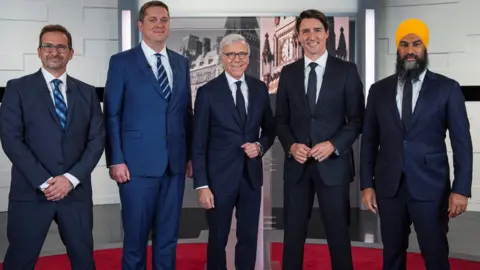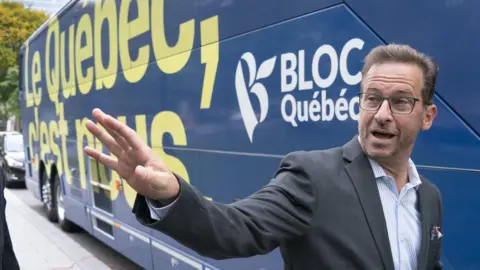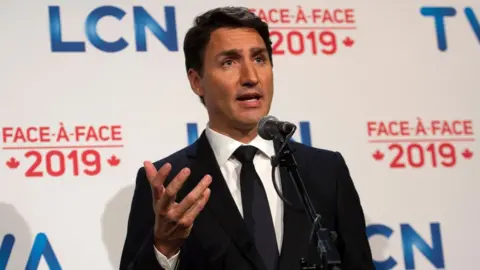Canada election: Party leaders clash in first French election debate
 Pool via Reuters
Pool via ReutersThe leaders of Canada's main parties clashed over the environment in the country's first big election debate.
The event in Quebec was the first time Prime Minister Justin Trudeau from the Liberal party, Conservative Andrew Scheer, the NDP's Jagmeet Singh and the Bloc Québécois' Yves-Francois Blanchet had faced off.
It comes ahead of two nationally televised debates next week.
Canadians go to the polls on 21 October.
The Liberals and Conservatives remain roughly neck-and-neck in what has so far been a two-way race for first place.
What happened in the debate?
Wednesday's French-language debate - broadcast live only in Quebec - saw Mr Trudeau forced to defend his government's environmental record.
In one heated exchange, Mr Scheer accused the Liberal leader of being a "fake environmentalist".
"There is only one leader on stage that has two campaign planes - one for him and the media and one for his costumes and canoes," he said, taking a swipe at Mr Trudeau for having two official campaign planes and for arriving at a recent campaign event in a canoe.
Mr Trudeau also came under pressure for taking the rare step of buying a crude oil pipeline for C$4.5bn ($3.4bn; £2.6bn) last year to help ensure a controversial project to triple its capacity would move forward.
Quebecers are some of the most environmentally conscious voters in Canada, and there is fierce opposition in the province to any major new oil pipelines projects.
Mr Trudeau defended what he called a "difficult decision," adding that transitioning the economy away from oil would not happen overnight.
 The Canadian Press
The Canadian PressMeanwhile Mr Scheer was also forced on the defensive over his plans for a national "energy corridor" to carry Canadian energy resources from coast to coast.
Mr Singh accused him of wanting to "force" a pipeline project on unwilling Quebecers.
"Conservatives think the market and the intervention from the Holy Spirit will solve climate change," quipped Mr Blanchet.
Green leader Elizabeth May was not invited to the debate as her party does not have seats in Quebec.
Is the Bloc Quebecois back from the brink?
Yves-François Blanchet took the helm of the Bloc Québécois - which only runs candidates in Quebec - in January after eight years of electoral decline and internal strife.
The party - which supports an independent Quebec - is in second place in the province ahead of the Conservatives, some surveys suggest.
It is running a campaign with a strong nationalist theme, and is vowing to vigorously support the province's interests in the capital Ottawa, including over issues related to immigration, the environment and state secularism.
Sparks frequently flew between Mr Trudeau and Mr Blanchet, with the Liberal leader accusing his opponent of trying to create "bickering between Ottawa and Quebec" for his own political ends.
What did they say about the religious symbols law?
Bill 21 is a controversial religious symbols secularism bill passed by Quebec's provincial legislature in June.
It bars civil servants deemed to be in positions of authority from wearing religious symbols at work.
 AFP via Getty Images
AFP via Getty ImagesIts supporters have praised the law as a reasonable step towards enshrining the separation of Church and state in Quebec.
Critics say it is discriminatory, it will make it more difficult for religious minorities to integrate into Quebec society and it unfairly targets Muslim women.
To varying degrees all the party leaders have spoken out against the legislation except for the Bloc Québécois, which backs the bill.
Mr Trudeau said he would defend the minority rights but reiterated he would let current court challenges against the bill run their course before deciding whether to intervene.
But he added: "The real threat I see with regards to state secularism is far right groups that are pushing an anti-women, anti-abortion, anti-LGBT [agenda]."
Mr Blanchet snapped back: "Are you saying that 70% of Quebecers who support the bill have some sympathy for far right groups?"
Mr Trudeau said questions would be asked of a "free society that allows for discrimination against someone because of their religion".
What about abortion rights?
Early in the debate, Mr Scheer was put on the defensive on social issues such as abortion rights.
Since the beginning of the campaign, the Conservatives have faced questions over whether they would reopen the abortion debate if elected.
The Conservative leader has said the party would not put forward or support legislation that would regulate abortion.
Mr Trudeau said there were three leaders on the debate stage "aligned with the values of Quebecers" and one who was not - a reference to Mr Scheer.
